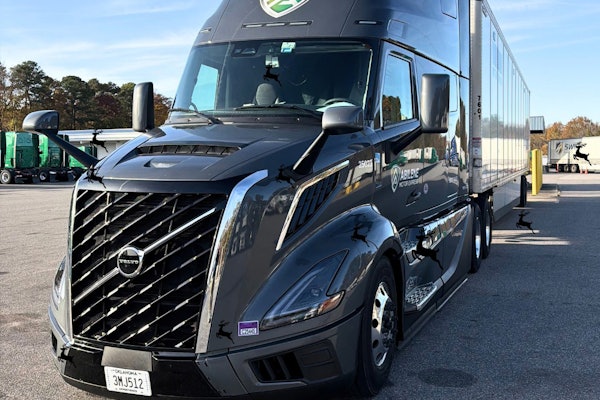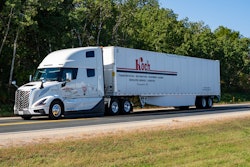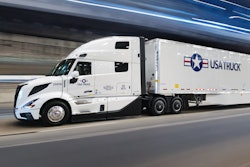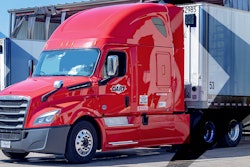“Paid by the day,” not by the mile, became The Daniel Co.’s branded slogan, says President Larry Daniel.
Traditionally, the over-the-road trucking industry has paid professional drivers based on cents per mile, so drivers must log as many miles as possible to achieve a higher paycheck.
Larry Daniel – president of The Daniel Co. of Springfield, a refrigerated carrier based in Southwest Missouri – believes there are real problems with this approach, which he says in many cases is unfair to the driver.
The Daniel Co. – a long-haul for-hire motor carrier founded in 1940 – specializes in expedited delivery of dry and refrigerated products, using two-driver teams to operate its 25 power units. “Some of our drivers have been with us since 1987,” Daniel says. The company’s primary service area is between the West Coast and the Midwest, with service to other areas on occasion.
Throughout much of the industry, when truckers sit at a dock, are stuck in traffic, stop to take a break or wait for repairs after a breakdown, they typically get paid nothing, Daniel notes. “Drivers have little control over the miles they get per week, once they have made themselves available for dispatch.”
While pay also might depend on a driver’s experience or how long he has worked for a company, Daniel believes that too many uncontrollable variables play a role in factoring their paychecks – variables that might prove a danger on the roadways.
“The temptation, and sometimes the necessity, to run too many miles in a short amount of time is something that nearly all drivers have experienced in the paid-by-the-mile environment,” Daniel says.
Compounding the problems inherent in this format is the concept of a cutoff day each week, and then the weeklong waiting time to get paid based on the miles the driver reached during the previous driving period.
“Everyone agrees this uncertainty of what you are going to make each week, and when you are going to get paid, creates stress, fatigue, unsafe driving and financial chaos for the average family,” Daniel says.
There wasn’t a particular event four years ago that prompted Daniel to begin thinking about revamping The Daniel Co.’s pay plan – no major wreck; no sudden increase in traffic stops, logbook violations or accidents; no group protest among disgruntled company drivers over pay or long hours; and no rash of driver exits beyond the usual turnover. Rather, it was just a general trend in attitudes and sentiment that had been building among his office staff and drivers over a period of time.
“I had kind of a rough idea that we needed to do something different, and it was something we needed to investigate,” says Daniel, who added that the plan wasn’t a personal brainstorm. “It was a consensus among the group that what we were doing wasn’t working very well.”
So Daniel and other executives at The Daniel Co. decided to toss the pay-by-the-mile benchmark. “As a group, we figured out another way that we thought made more sense,” he says.
Company executives devised a way to pay drivers that Daniel says is fairer, while at the same time reduces driver fatigue and encourages safety. “We thought this might be more interesting to drivers,” Daniel says. “We know it is a fair pay system that encourages safety, while rewarding those who are experienced and those who go over and above the minimum requirements of a driver.”
That’s when “paid by the day,” not by the mile, became the company’s branded slogan.
How it works
Today, The Daniel Co. pays team drivers a daily base wage for each day they are out on a trip; the rate varies, depending on whether the driver is a lead or second seat. The base wage is enhanced according to the number of verifiable years of experience.
Then things become more interesting for team drivers: They have the ability to earn daily incentive bonuses for the trip if they meet the company’s requirements of efficient, safe operation for the haul.
Daniel and other executives devised criteria for seven levels of incentive bonuses for each trip. Most of the bonuses are geared toward various goals for safety (no reportable accidents or incidents), customer service (on-time delivery) and personal behavior (proper attire and professional conduct). Other components involve fuel conservation: MPG and idle time are tracked for each trip.
Daniel prefers not to detail the incentives because the grading scale his company uses is unique to its drivers and customers. The point is not the specific formula but rather the concept, he says. Any other trucking operation planning to use such a scale would – and should – customize it to suit its own purposes.
But Daniel does emphasize that all of the goals for the incentives are easily attainable for drivers who are doing what’s expected of them as representatives of The Daniel Co. “As long as they’re doing what they should be doing in a timely matter and keeping customers happy, and doing a good job, they’re making the grade.”
The pay plan is intended to allow drivers to earn competitive wages for every day they are out – even if they’re sitting at a dock, stuck in traffic, stopping to take a break or waiting for repairs after a breakdown. “We have pretty new equipment, so that hasn’t really been an issue,” Daniel says. “But if that happens, we normally can get them another truck in 24 hours. We also have layover pay if there’s nothing going on.”
There also are no cutoff days, so drivers can turn in their paperwork when they arrive back at the terminal and wait for their check to be processed. This approach benefits the driver and family by allowing them to plan and budget their finances, Daniel says.
“If drivers get stuck somewhere loading or unloading, they don’t have to worry about making enough money to buy beans,” Daniel says. “They know if they’re out of the road, they’re going to get paid.” And by removing miles from the pay equation, there’s little incentive for drivers to push themselves past the point of exhaustion, he says.
Since its inception, the plan has been well received, and more outside drivers have shown interest in becoming a part of The Daniel Co. team. The company’s turnover rate has been lowered by about 30 percent, Daniel says.
And whether it’s because of the pay plan or not, Daniel’s drivers now are taking greater care on the nation’s roadways. He says the company’s recordable accident rate has lowered 75 percent after implementing the “paid by the day” plan.
“Enhanced safety and legal operation is the most significant benefit to the company, to the drivers and their families, and to millions of motorists on our nation’s highways,” Daniel says. “The low frequency and severity of accidents and incidents is paying dividends to the company, and everyone feels good about their contribution to improving highway safety.”
Innovators profiles carriers and fleets that have found innovative ways to overcome trucking’s challenges.
If you know a carrier that has displayed innovation, contact Avery Vise at [email protected] or (800) 633-5953.









